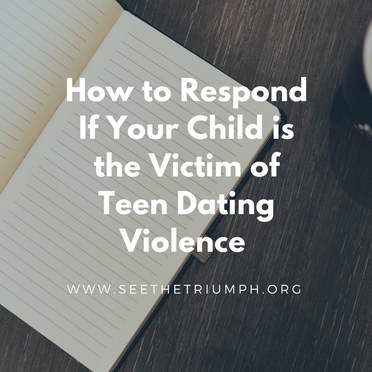|
By Cara Medina, See the Triumph Guest Blogger It’s common for teenagers not to tell their parents that there is physical, sexual, or emotional abuse happening to them. Do you wonder why your teen doesn’t trust you enough to tell you these types of problems? Have you ever thought about how you would respond if your child told you they were being abused by their boyfriend or girlfriend? Adolescents do love and trust their parents, but they may feel ashamed they have been the victim of abuse at the hands of their romantic partner. They also may not realize how serious dating violence can be and the damage it can do to their mental and physical health. Also, teenagers are in a developmental stage of life that can make it difficult for them to disclose abuse. For example, teens often believe they can “handle it” themselves, even though they may need help from their parents. They often overestimate their abilities to manage a complicated situation. Children this age also tend to minimize the potential consequences of risky behaviors. They may not believe that something bad could happen to them. In addition to the shame and developmental factors, they could be worried that their parents might be angry or upset and punish them, even though they’re the victim. Listed below are a few tips that could help parents if they notice any red flags of dating violence.
References
 Cara Medina is a graduate of the Department of Counseling and Educational Development at the University of North Carolina Greensboro. She earned her M.S. and Ed.S degrees in School Counseling. She has counseled middle school, high school and college students. Cara lives in Greensboro with her husband and five children. Comments are closed.
|
Archives
July 2024
CategoriesAll About Intimate Partner Violence About Intimate Partner Violence Advocacy Ambassadors Children Churches College Campuses Cultural Issues Domestic Violence Awareness Month Financial Recovery How To Help A Friend Human Rights Human-rights Immigrants International Media Overcoming Past Abuse Overcoming-past-abuse Parenting Prevention Resources For Survivors Safe Relationships Following Abuse Schools Selfcare Self-care Sexual Assault Sexuality Social Justice Social-justice Stigma Supporting Survivors Survivor Quotes Survivor-quotes Survivor Stories Teen Dating Violence Trafficking Transformative-approaches |
Search by typing & pressing enter



 RSS Feed
RSS Feed